Late evening May 24, 1945 Okinawa's Yontan airport is attacked by a formation of Japanese suicide paratroopers. A handful of commandos, engulfed in a frenzy of destruction, jump out of the bullet-riddled and devoid of landing gear plane. Their desperate mission could have unexpectedly tragic consequences ...
The fighting for Okinawa had been going on for two months. The scales of victory tilted more and more to the Americans. Already on the day of landing, they captured practically intact Japanese Yontan and Kadena airports. In the third decade of May, these were large, perfectly arranged air bases capable of accepting virtually any type of aircraft. Even four-engine liberators operated from Yontan.
During the first month of fighting, both airports were constantly attacked night after night by the Japanese air force. Kadena, located closer to the front line, was additionally shelled by heavy artillery. However, as the US troops advanced, the situation around the airports calmed down. No bomb or projectile fell on them for several weeks. Until May 24, 1945
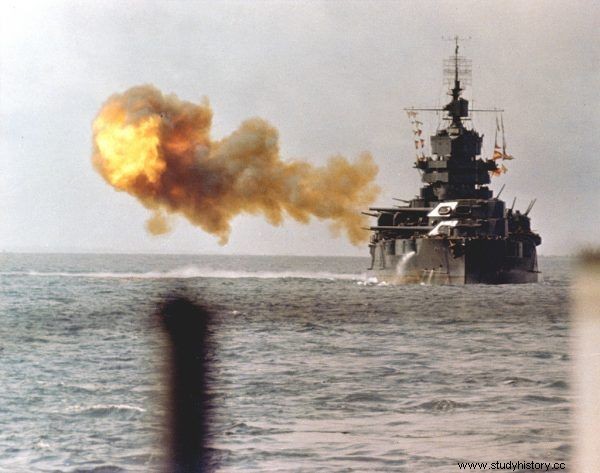
The American battleship USS Idaho bombs Japanese positions in Okinawa, April 1, 1945 (Photo:U.S. Navy, Naval History and Heritage Command, public domain).
Giretsu Kuteitai
On November 24, 1944, B-29 bombers, taking off from the Marianas bases, made the first raid on Tokyo since the Doolittle Rally in 1942. As a result of this event, the Japanese General Staff came up with the idea of creating a special commando unit , the so-called the Giretsu Kuteitai formation (hero paratroopers).
These soldiers were to specialize in subversive night attacks on American heavy bomber bases . The commander of the unit was Captain Michiro Okuyama, an expert in the field of engineering troops and sabotage.
The unit itself consisted of five platoons of 126 soldiers, derived from the parachute troops of the army. In addition, there was a 10-person staff. They were all carefully selected soldiers of an iron condition . They knew the various martial arts very well :judo, jujitsu, kendo. They were skilled in the use of both a knife and a firearm. They have also been trained to destroy B-29 bombers with various types of explosives.
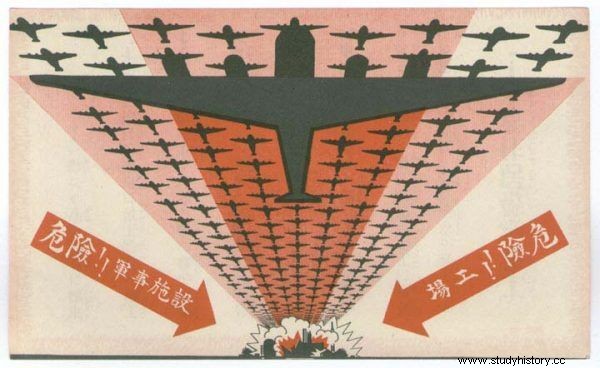
An American propaganda flyer dropped on Japan. The picture speaks for itself (fig. Public domain).
To the extinction
May 24, 1945 at At 18.50, 12 Mitsubishi Ki-21 bombers with Japanese commandos took off from the Kumamoto airport on the island of Kyushu. Okuyama himself was in charge. The destination of the expedition was the Okinawa airports. Japanese planes were to land on them in the dark, and the paratroopers would do maximum damage there. It was originally a suicide mission. Captain Okuyama predicted that anyone would be capable of destroying at least 2-3 enemy planes before his men were killed.
The action started unfortunately. Shortly after take-off, four bombers had to turn back due to technical faults. Several more were intercepted by American fighters. Five Japanese machines got into the immediate area of the Yontan airport. At that point, however, three American anti-aircraft squadrons opened barrage fire from 40mm and 90mm guns.

"Yolk ... you're next!" - American posters after the end of the war with Germany were threatened (ill. Public domain).
Two machines exploded in the air. The third, apparently badly damaged, crashed into the nearby hills. The fourth turned into a fireball as it landed . The pilot, seeing that he would not be able to touch down, directed the burning bomber towards the American fighters parked along the runway.
The last machine, with tactical number 546 on the stabilizer, pierced by shells from US anti-aircraft artillery, landed without a landing gear, scattering sparks across the runway. Before the bomber stopped, the side door jumped open and a group of Japanese people firing machine guns and throwing grenades spilled out of it ...
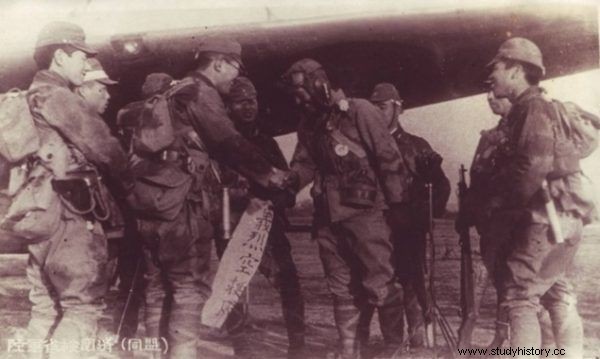
Michiro Okuyama before departing on his suicide mission (photo:Tsuguichi Koyanagi, public domain).
"Beautiful, dark and sweet night ..."
Right before the attack, Yontan airfield was blissfully quiet. The staff enjoyed their time listening to Louis Armstrong's music or playing cards. Some were going to sleep, others were still working. Private Jack Kelly, a fighter squad mechanic, was just busy on one of the machines when an alarm sounded at the airport. It was 22.30. As he later recalled: The evening started quite normally and turned into the most exciting event in my life .
He managed to get to the bunker in which there were still a dozen other soldiers. They had no weapons with them. The Japanese "Sally" stopped only a hundred meters from their hiding place. They would be without a chance if detected by giretsu . They could only helplessly listen as the attackers blow up planes. Fortunately, several Marines guards came to their aid soon .
The chaos at the airport was intensified by the darkness. The Americans shot at each other several times, resulting in many wounded . The duty officer at the control tower, Lieutenant Maynard C. Kelley, was fatally wounded by machine guns of the Japanese when he shone a searchlight on them.
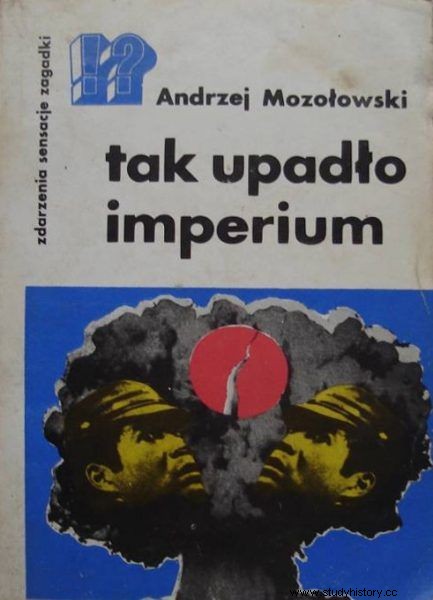
The article was based, inter alia, on on the book by Andrzej Mozołowski "So the empire collapsed", Krajowa Agencja Wydawnicza 1984.
Landscape after battle
The Americans gradually took control of the situation, but the shooting at the airport lasted practically all night. They didn't get the last dwarf until dawn - recalled another mechanic Roy Stander - there was a stench of burning rubber and burning gasoline everywhere. And this bland, strong smell. Fried skin and hair …
A total of 69 bodies of Japanese were found near the airport. Some have committed suicide. Two were seriously injured. One died right away. Second - as Stander recalled - (...) barely breathed. But I didn't see anyone wanting to help him .
The losses of the Americans were also high. Giretsu they destroyed three F4U Corsair fighters, two naval patrol privateers, and four transporters. Twenty-nine other aircraft, including two Liberators, were damaged. 265,000 went up in smoke liters of aviation fuel , gathered in two warehouses. In addition to Lieutenant Kelley, two more airfield security soldiers were killed, eighteen other Americans were injured. Most of these losses were from own fire.
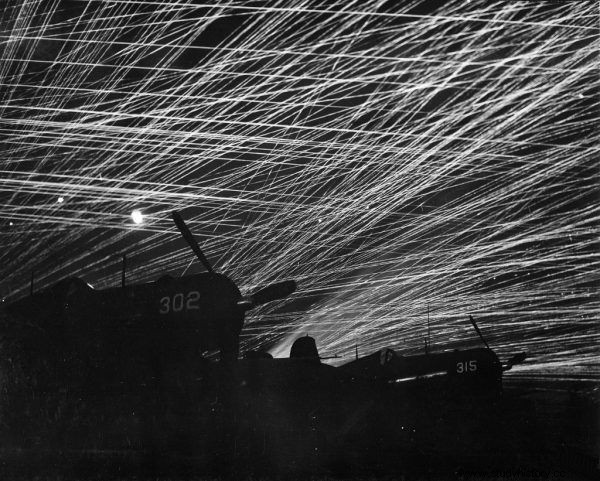
American air defense fire at Yontan airport (photo:T.Sgt. Chorlest, National Archives and Records Administration collection, public domain).
First (and last) task
It was the only operation of this type performed by Japanese paratroopers. Sacrifice of giretsu however it was in vain. Ultimately, this action had little impact on the final outcome of the fighting in Okinawa. The advantage of the opponent was overwhelming. Less than four weeks later, on June 21, 1945, the Americans announced that the island had been taken over, although small groups of Japanese soldiers fought practically until the end of the war.
The operation of the Japanese paratroopers was close to indirectly influencing the final end of the struggle in the Pacific . On August 19, 1945, two white-painted Mitsubishi G4M bombers marked with green crosses landed at the airport on the island of Ie Shima. They brought high-ranking Japanese officers led by General Kawabe Torashiro. From here, they were to fly an American plane to Manila, for capitulation talks with General MacArtur.
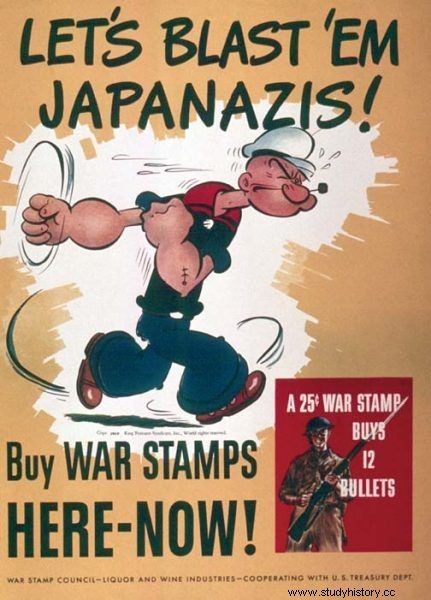
Let's destroy the Japanese! (il. public domain).
No officials greeted the Japanese at the airport. Nobody greeted them at all. In return, the entire edge of the runway was manned with numerous machine gun positions. The Americans did not know what to expect from the newcomers and, remembering the lessons, this time they decided to be prepared. The US commander ordered his troops: If any of these Japanese officers start acting weird, you will mow them down. You will beat them to the leg .
Fortunately, the Japanese generals were sensible. Peace negotiations have started. How would the conflict develop further if, even by accident, Japanese parliamentarians were shot? Would the Japanese break negotiations and the war wouldn't last much longer?
